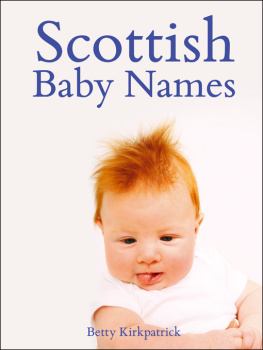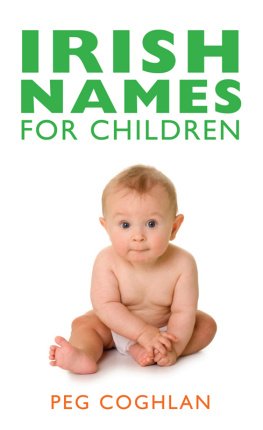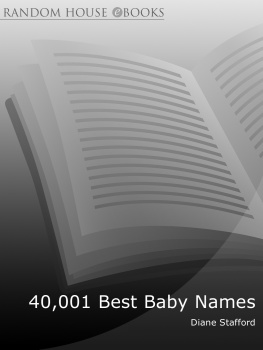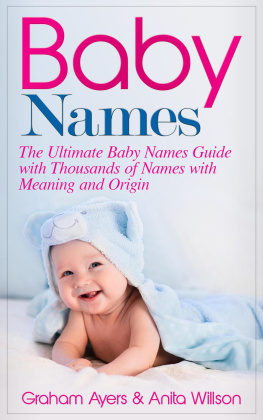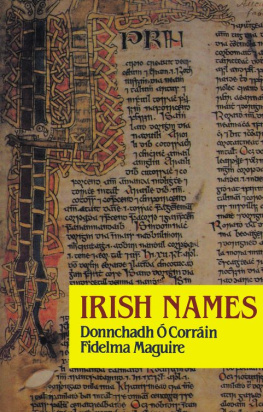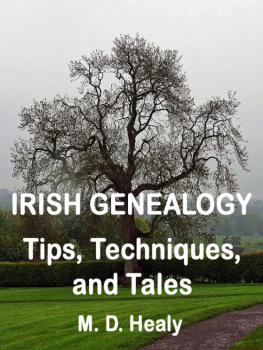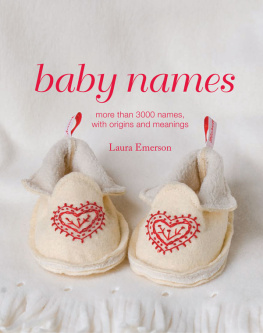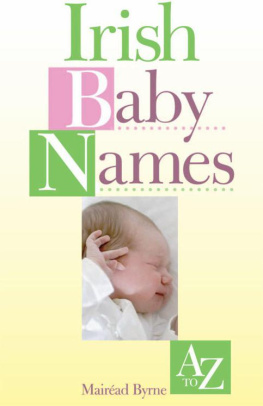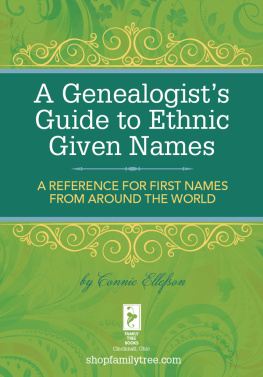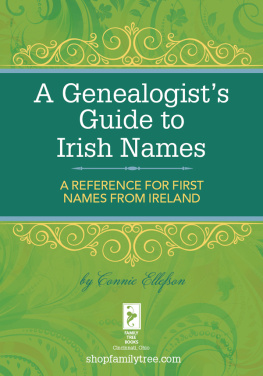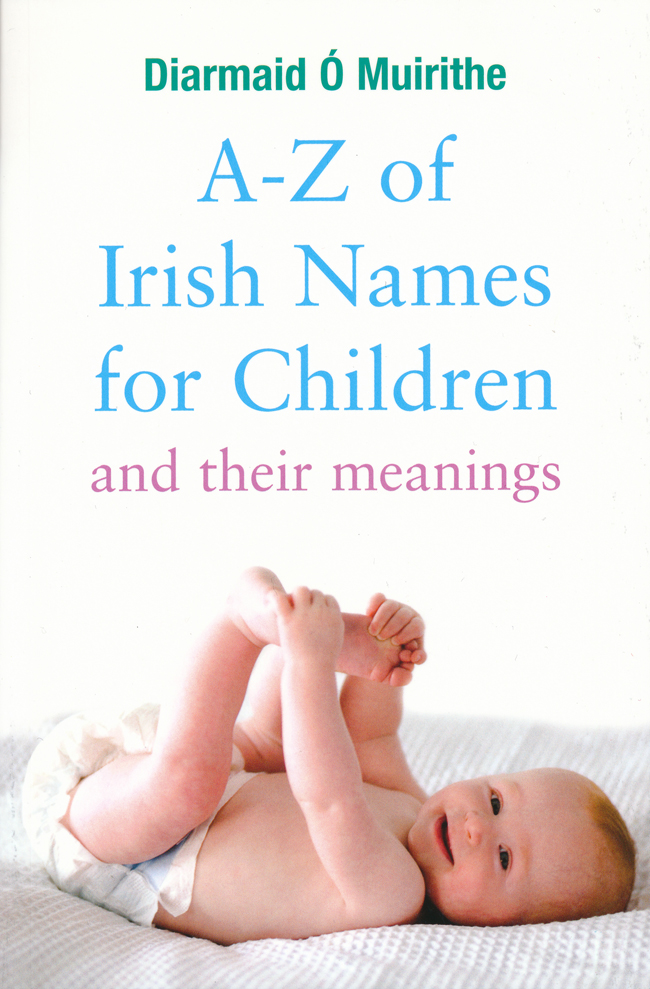AZ OF IRISH
NAMES FOR
CHILDREN
AND THEIR MEANINGS
DIARMAID MUIRITHE
Phonetic transcription by
Mire N Chiosin
Gill & Macmillan
Publisher's note: The phonetic alphabet in the Pronunciation section of this book will display correctly only when viewed in Original or Publisher font.
CONTENTS
INTRODUCTION
C hristian, or first, or given names are, among other things, badges of familial and cultural identity. Names come and go, and for sometimes obscure reasons may come into vogue again centuries after they have fallen into disuse. Most names fluctuate in popularity, even those hardy perennials John and Mary, but they never die out.
In Ireland parents have a wonderful selection of personal names to choose from. We have our own Irish versions of biblical names such as Adam and Aaron, Simon and David as well as the names of the evangelists and of continental saints who have taken our fancy at various stages in our history.
The Vikings left us some of their personal names, such as Raghnall and its female counterpart Raghnailt; Lochlainn and omhar, which in either their Irish or their anglicised forms have proved to be as hardy a growth as those names bequeathed to us by the Anglo-Normans, names such as Risteard, Mrtan, Annbla or Nbla; scores of them are included in this book.
And of course we have the great repository of our old Irish native tradition to choose our childrens names from, and it is a source of delight to me, at any rate, to know that children are being given names such as mer, Fergal, Dairearca, Dairne, Donncha, rnait, Colm and even Setanta once again.
The names of the great Irishmen who brought a high civilisation to Continental Europe in the so-called Dark Ages have been discarded there over the years, as have these Irish names from twelfth-century Iceland, recorded in the Landnma bk, the Icelandic Book of Settlement: Dufan, Dufniall, Feilan, Gilli, Kaall, Kaln, Kaillakr, Kalman, Kiaran, Kiarvair, Konall, Kormlo, Kylan, Lunan, Meldun, Melkorka, Melpatrikr, Niall, Parak, Patrekr, Raforta.
I hope this book may be of help to parents and prospective parents in choosing names for their offspring.
I must offer my thanks to professors Dith hgin and Donnchadh Corrin for their generosity, two men whose knowledge of ancient lore is unsurpassed. My thanks too to Canon Samas de Bhl of Bunclody for allowing me to use unpublished material on Wexfords saints, and to Karin Lach of the Fachbereichsbibliothek Anglistik und Amerikanistik der Universitt Wien for her generous help. My thanks too to the librarians in the sterreichische Nationalbibliothek in Vienna for supplying me with other indispensable works of reference. I am grateful too to Fergal Tobin and Deirdre Rennison Kunz of Gill & Macmillan for helping to bring the book to its finished form. The responsibility for the books flaws and foibles are mine alone and I hope that whatever measure of illumination it contains makes up for them.
Diarmaid Muirithe
Vienna, Autumn 2006
A
AARON (m) This biblical name is now used in Ireland more frequently than in the past. The reason why biblical names such as Abigal, dhamh and Aaron are beginning to be used again is unclear. The name was used sparingly in early Ireland by monks. There was a St Aaron, a Welshman, martyred in the reign of Diocletian. Could his death have had an influence here, I wonder?
Aaron was the brother of Moses. He was appointed by the Almighty to be Moses spokesman on earth and according to Exodus he was the first high priest of the Israelites. The current thinking on the names origin is that, like Moses, it is of unknown Egyptian rather than Hebrew origin. Hanks and Hodges regard the oft-quoted derivation from Hebrew har-on (mountain of strength) as mere folk etymology
ABBN (m) This sixth-century saint was and is still venerated in Co. Wexford in the Adamstown area. He was of noble lineage and was abbot of Magh Arnaidhe (Adamstown). Flire engusso refers to him as Abbn Ua Cormaic and Filire na Naomh nireannach says he was descended from the race of Labhraidh Lorc. He was sent before his teens to St Iobhar (Ibar), said to have been his uncle, at the foundation of Begerin in Wexford Harbour. Later he was said to have founded monasteries at Cill Abbin (Kilabban), Co. Laois, and in other places. His feast day is 16 March. He is sometimes confused with another Abbn, also a Leinster saint whose feast day is 27 October, but of whom nothing else is known.
DHAMH earlier DAM (m) The biblical name dam was used by clerics of the early Irish Church. A seventh-century Irish abbot of Fermo in Italy bore the name. Afterwards it became quite popular when it was reintroduced by the Anglo-Normans. The name probably comes from the Hebrew adama (earth); in the creation legends the first human beings were created from earth or clay, and life was breathed into them by a god.
AIBHISTN, OISTN (m) Irish forms of the name of St Augustine of Hippo (from Augustinus, a derivative of Augustus) who lived from 354 to 430; and of St Augustine, the sixth-century bishop of Canterbury. The Augustinian friars had some important monasteries in pre-Norman Ireland, notably at Ladys Island, Co. Wexford, a house sacked by Cromwells soldiery but still an important place of pilgrimage. The Augustinians brought with them one interesting custom which still survives in the Anglo-Norman baronies of Forth and Bargy in Co. Wexford. On the road between the church and the graveyard one may see little wooden crosses piled on whitethorn trees, an interesting fusion of the Christian symbol and the pagan symbol of resurrection and new life in nature. The custom, it is said, can be traced to Charlemagnes time.
Fletcher (1616) who calls herself thy servant. The name seems to be gaining a little in popularity again.
AIFRIC earlier AFFRECA (f) The name of two abbesses of Kildare, one of whom died in 738, the second in 833. The name meaning charming, pleasant is found in Scotland, where there is a Lough Afric, and in the Isle of Man as well as Ireland. Aithbhreac was the Scots Gaelic form of the name. The most famous Aifric or Affreca was the daughter of Godred, King of Man, who married John de Courcy, the ruler of east Ulster for 27 years from 1177. She founded Grey Abbey in Co. Down. Columba Mansfield, Augustine poet, wrote this about her:
Daughter of the raven ships
Affreca, brought a warrior fleet
As dowry to her lord, de Courcy,
Knight of the eagle standards.
On Mans Isle they kissed as
Hawks swooped above them.
Later they smiled across a chessboard.
De Courcy castled Ulster
While Affreca smiled and
Won Dunleavys conquered heart.
Bishops and abbots graced her table
And lived in homes she granted.
Later, de Lacy crushed Affrecas eagle,
Shattering her king-fathers ships.
The widow Affreca lived on,
Remembering.
Does she still smile on Ulster?
Eagles vanish while sparrows survive.
Affreca was, I think, a skylark.
AILBHE earlier AILBE (m, f) Ailbe was one of the great pre-Patrician saints of Munster whose feast day is 12 September. The Annals of Innisfallen record his death in 528. His foundation was at Imlech Iubhair (now known as Emly), Co. Tipperary. Legends about him abound. Like many another Irish saint he was fond of wild animals. One story has him suckled by wolves. In his old age it was said that the local people organised a great wolf hunt. One of the wolves came in distress to Ailbe who told it not to be afraid as he himself was suckled by a wolf in infancy. He fed the wolf every day and when the people saw this, they called off the hunt.


